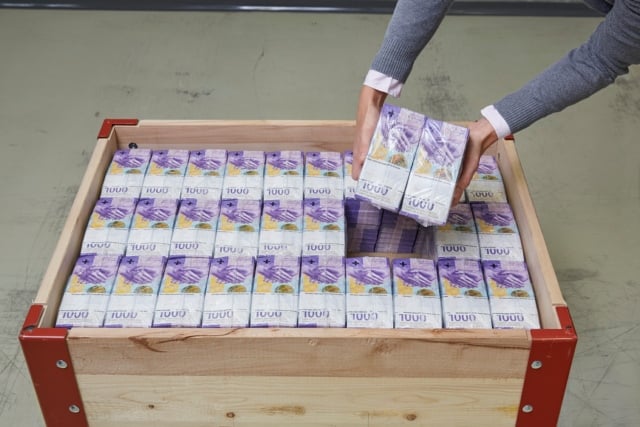Is the new Swiss 1,000-franc bill the world's most valuable bank note?
No, but there aren't many contenders left. Only Brunei’s B$10,000 note is worth more than the new Swiss 1,000-franc note. It is worth around 7,440 Swiss francs (€6,550).
By contrast, the highest denomination note in the US is just $100 while the UK has a £100 note.
How many of the old 1,000-franc notes are there floating around?
More than you would think. According to Swiss National Bank (SNB) figures, there is around 48.6 billion francs in circulation in the form of 1,000-franc notes. That is some 59 percent of all Swiss notes in circulation.
Why is the 1,000-franc note controversial?
Critics claim the high-denomination Swiss note is the perfect vehicle for money laundering, tax evasion and other criminal activities.
Indeed, by unveiling a new version of the note, Switzerland is bucking the international trend. In 2016, the European Central Bank announced it would stop producing and issuing its 500-euro note over concerns it “could facilitate illicit activities”.
Transparency International has repeatedly called for Switzerland to scrap its 1,000-franc note for the same reason.
But the Swiss government has defended the high-denomination note, saying there is no evidence to suggest the 1,000-franc bill has any particular link to criminal activities and noting that Switzerland’s culture of cash usage and high prices and salaries justify the note’s existence.
But a study carried out by Swiss economist Yvan Lengwiler and quoted by Swiss daily NZZ could tell a different, darker story.
According to that research, there is a rush on 1,000-franc notes in December every year as people move their assets to cash. The money is then deposited in bank accounts again in the new year. In other words, the notes could be being used in the process of avoiding wealth tax.
How is the new 1,000-franc note different from its predecessor?
Both are a regal-looking violet in colour but the new note is far shorter: just 158mm long against 181mm for the old version.
What does the artwork on the new 1,000-franc note represent?
According to the SNB, the design “focuses on Switzerland’s communicative flair – expressed by language”. The other core design elements are the hand and the globe, which appear on every denomination in the new series.
What security features does the new note contain?
The news note has 16 different security features. If you want to find out if your note is the genuine article or a fake, check here.
How long will the old 1,000-franc notes remain legal tender?
The Swiss National Bank says the old notes will remain legal tender until further notice.
When can I get my hands on one of the new notes?
The notes will go into circulation on March 13th at Swiss National Bank offices in Bern and Zurich and at the headquarters of 14 cantonal banks. It will then start to appear in ATMs in the following days.
Is Switzerland going to release any more new bank notes?
Yes. The final note in the new 'ninth series' is the 100-franc note, which will be unveiled on September 3rd and go into circulation on September 12th. The new 200-franc, 10-franc, 20-franc and 50-franc notes are already in circulation.
The updated 10-franc note, released in October 2017, was rated the world's best for last year by the International Bank Note Society. That award came after the new Swiss 50-franc note claimed the same prize in 2016.



 Please whitelist us to continue reading.
Please whitelist us to continue reading.
Member comments